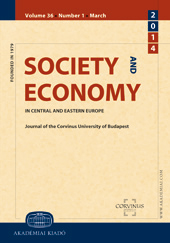Social Capital and Leadership: Rural Cooperation in Central and Eastern Europe
Social Capital and Leadership: Rural Cooperation in Central and Eastern Europe
Author(s): Annette Hurrelmann, Catherine Murray, Volker BeckmannSubject(s): Economy, Agriculture, Rural and urban sociology, Business Ethics, Socio-Economic Research
Published by: Akadémiai Kiadó
Keywords: social capital; Central and Eastern Europe; rural cooperation;
Summary/Abstract: There is controversy about the potential for collective action in Central and Eastern European Countries (CEECs). Many authors argue that the level of social capital is low in CEECs, whereas others underline that, while trust in authorities and the state may be low, interpersonal networks are present. This paper explores the issue on the basis of three case studies conducted in the project IDARI (“Integrated Development of Agriculture and Rural Institutions in Central and Eastern European Countries”). They study rural cooperation projects, i.e. production and marketing in agricultural cooperatives, a rural tourism initiative and the management of a national park. It was asked: what is the basis for successful cooperation and what are the reasons why cooperation fails? The conclusion is that two main obstacles for collective action in rural CEECs are low bridging of social capital and unclear gains from cooperation. In such a situation, well-connected local leaders who provide credible information and establish links among different actor groups and with authorities can be of crucial importance to achieve collective action. This finding is interesting because most of the literature on social capital does not acknowledge the need for a “mediating agency”but expects cooperation to happen “automatically”where enough social capital is present. However, it is also shown that leadership becomes difficult where conflicting interests, low general trust and little initiative of actors prevail. A policy conclusion is that better financial and technical support for prospective leaders in rural cooperation projects in CEECs could contribute to the success of initiatives.
Journal: Society and Economy. In Central and Eastern Europe ǀ Journal of the Corvinus University of Budapest
- Issue Year: 28/2006
- Issue No: 3
- Page Range: 219-243
- Page Count: 26
- Language: English

